Unit 4 Natural Disasters Reading and Thinking 课件(共30张PPT)
文档属性
| 名称 | Unit 4 Natural Disasters Reading and Thinking 课件(共30张PPT) |  | |
| 格式 | pptx | ||
| 文件大小 | 305.1KB | ||
| 资源类型 | 试卷 | ||
| 版本资源 | 人教版(2019) | ||
| 科目 | 英语 | ||
| 更新时间 | 2023-11-28 14:40:32 | ||
图片预览

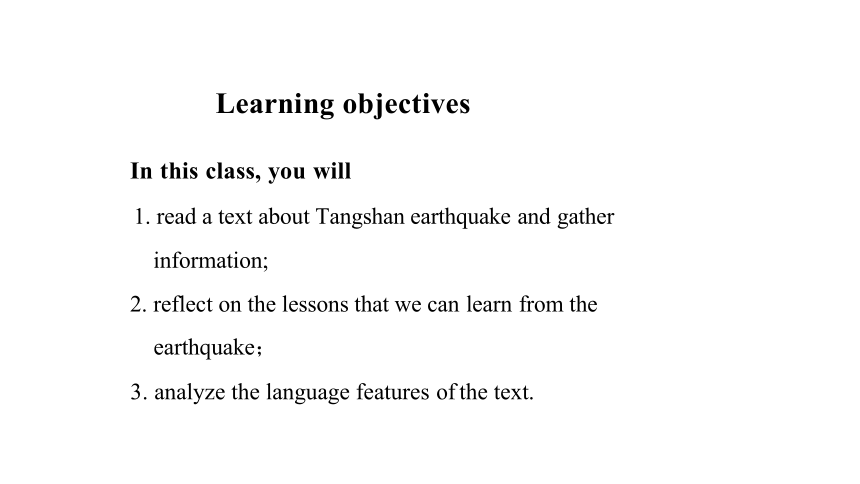
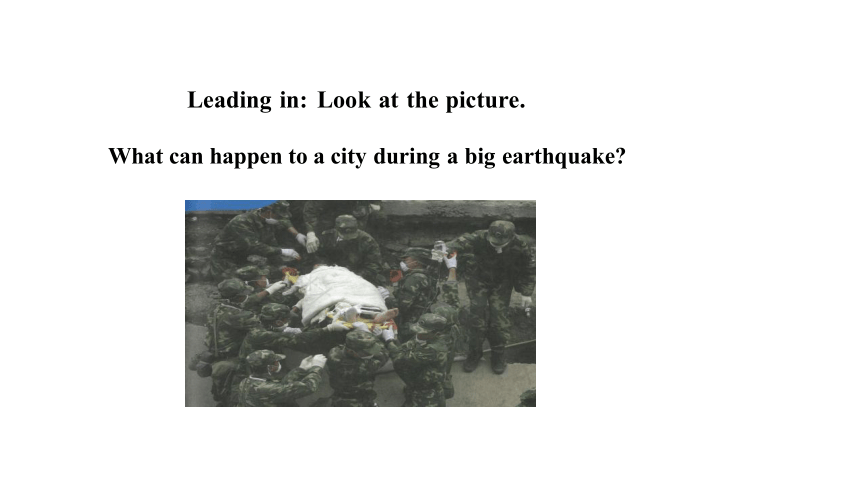
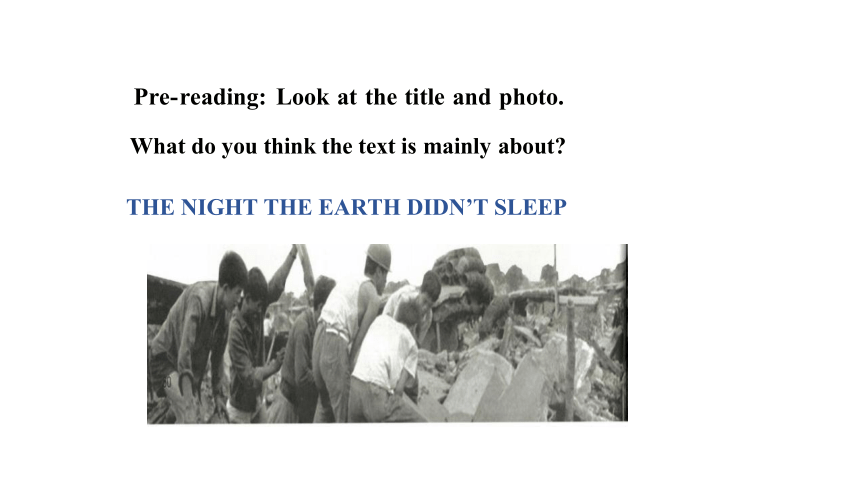
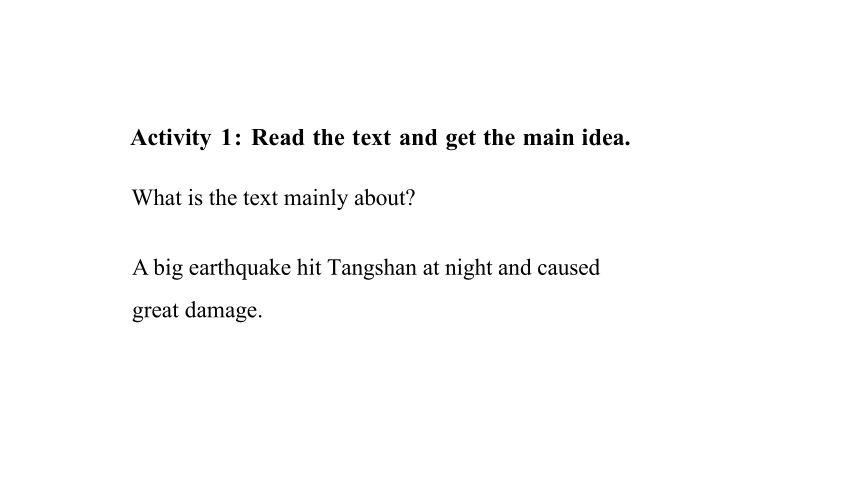
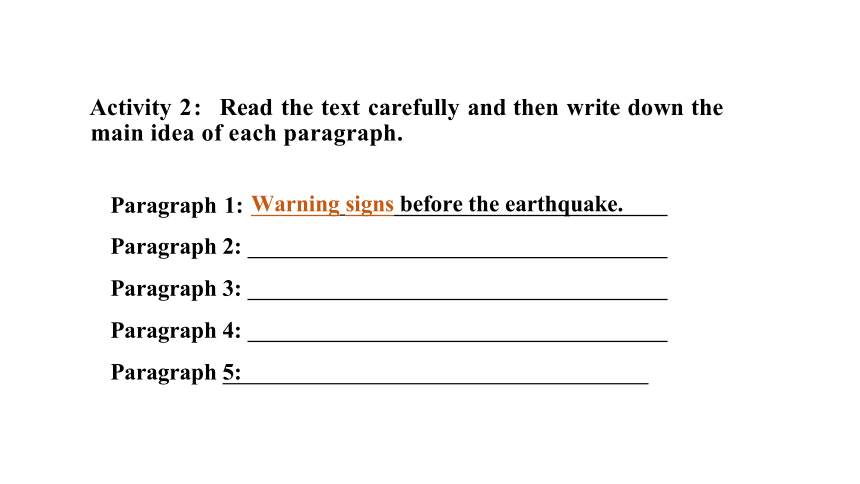
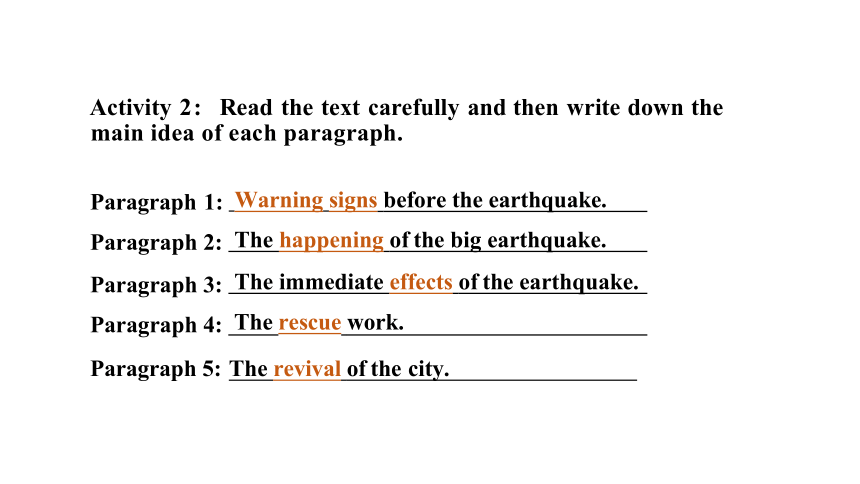
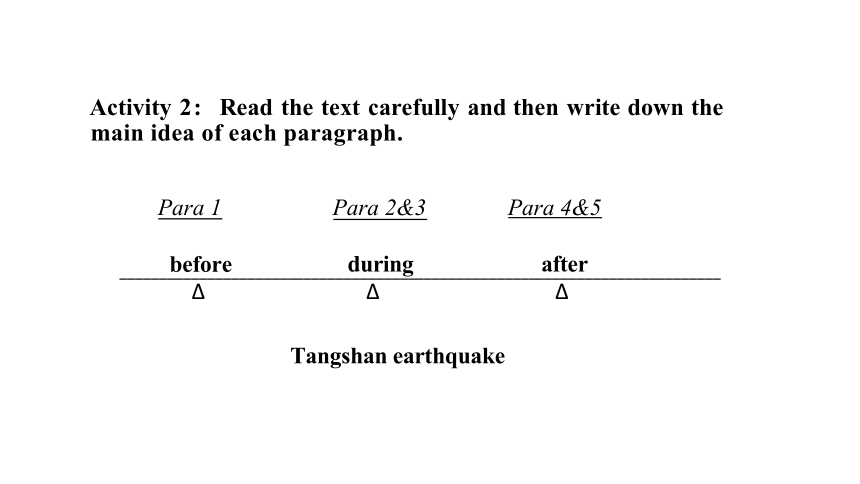
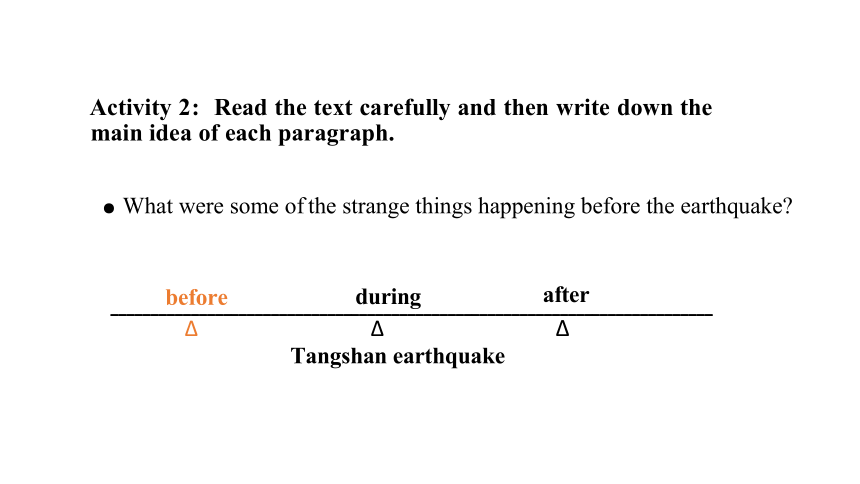
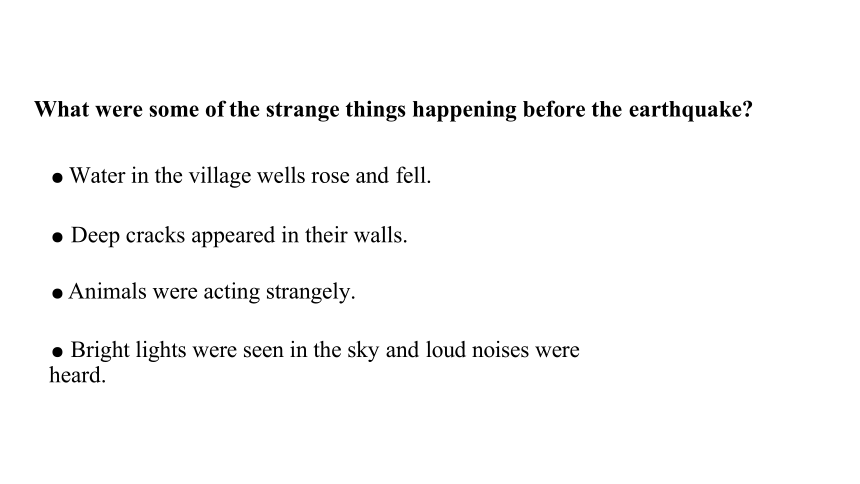
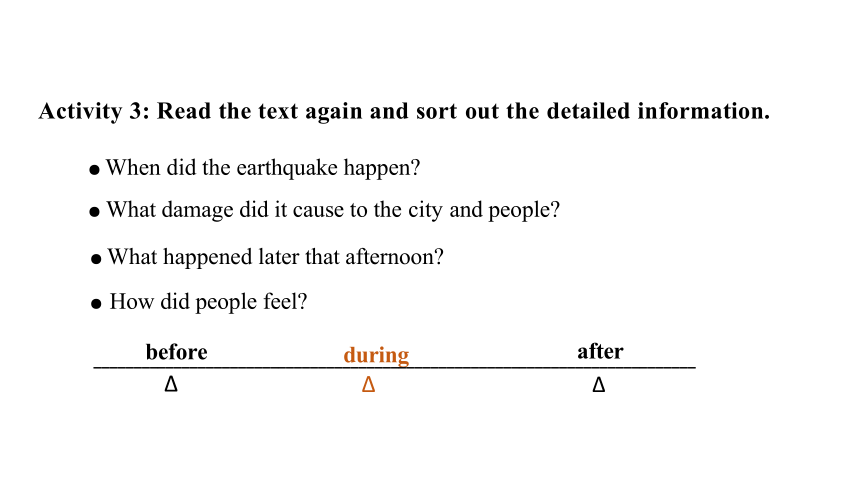
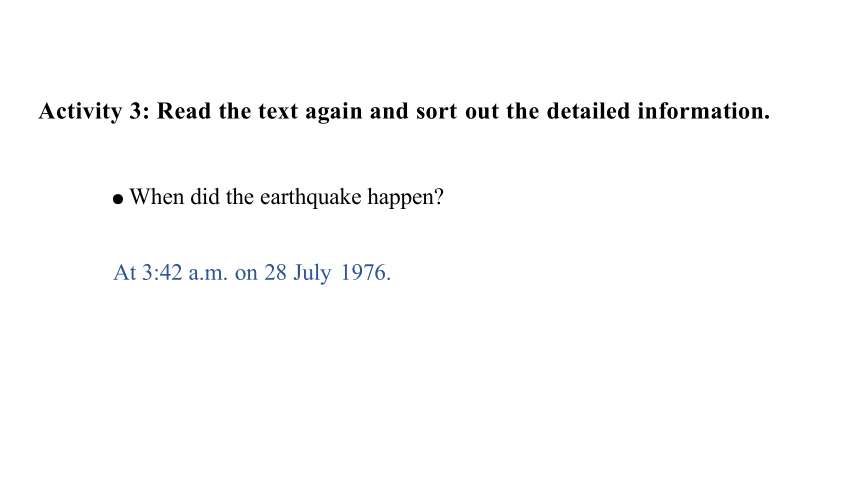
文档简介
(共30张PPT)
Unit 4 Natural Disasters Reading and Thinking
Learning objectives
In this class, you will
1. read a text about Tangshan earthquake and gather
information;
2. reflect on the lessons that we can learn from the
earthquake;
3. analyze the language features of the text.
高中英语
Leading in: Look at the picture.
What can happen to a city during a big earthquake
高中英语
Pre-reading: Look at the title and photo.
What do you think the text is mainly about
THE NIGHT THE EARTH DIDN’T SLEEP
高中英语
Activity 1: Read the text and get the main idea.
What is the text mainly about
A big earthquake hit Tangshan at night and caused
great damage.
高中英语
Activity 2: Read the text carefully and then write down the main idea of each paragraph.
Paragraph 1: Warning signs before the earthquake.
Paragraph 2:
Paragraph 3:
Paragraph 4:
Paragraph 5:
高中英语
Paragraph 1: Warning signs before the earthquake.
Paragraph 2: The happening of the big earthquake. Paragraph 3: The immediate effects of the earthquake. Paragraph 4: The rescue work.
Paragraph 5: The revival of the city.
高中英语
Activity 2: Read the text carefully and then write down the main idea of each paragraph.
Activity 2: Read the text carefully and then write down the main idea of each paragraph.
Para 1 Para 2&3 Para 4&5
Tangshan earthquake
during
高中英语
before
after
Activity 2: Read the text carefully and then write down the main idea of each paragraph.
● What were some of the strange things happening before the earthquake
Tangshan earthquake
during
高中英语
before
after
What were some of the strange things happening before the earthquake
● Water in the village wells rose and fell.
● Deep cracks appeared in their walls.
● Animals were acting strangely.
● Bright lights were seen in the sky and loud noises were heard.
高中英语
● When did the earthquake happen
● What damage did it cause to the city and people
● What happened later that afternoon
Activity 3: Read the text again and sort out the detailed information.
● How did people feel
during
高中英语
before
after
Activity 3: Read the text again and sort out the detailed information.
● When did the earthquake happen
At 3:42 a.m. on 28 July 1976.
高中英语
Activity 3: Read the text again and sort out the detailed information.
● What damage did it cause to the city and people
Nearly everything was destroyed and more than 400,000 people were
killed or badly injured.
高中英语
Activity 3: Read the text again and sort out the detailed information.
● What happened later that afternoon
Another big quake shook Tangshan again.
● How did people feel
They felt shocked and helpless.
高中英语
1. Who came to the rescue What did they do
2. What does the author mean by “ Slowly, the city began
to breathe again”
高中英语
Activity 3: Read the text again and sort out the detailed information.
during
before
after
Activity 3: Read the text again and sort out the detailed information.
1. Who came to the rescue What did they do
150,000 soldiers. They were sent to dig out those who were trapped and bury the dead.
More than 10,000 doctors and nurses. They came to provide medical care.
高中英语
When you see a word you do not know, do not stop
and look it up in the dictionary. If you continue reading,
the context will probably help you understand what it means.
Use context to understand new words
高中英语
Activity 3: Read the text again and sort out the detailed information.
1. Who came to the rescue What did they do
Workers. They built shelters for survivors whose homes
had been destroyed.
高中英语
Activity 3: Read the text again and sort out the detailed information.
2. What does the author mean by “ Slowly, the city began to breathe again”
The writer means that the city began to function again.
高中英语
Activity 4: Reflect on the lessons we can learn from the earthquake.
● What do you think helped the revival of Tangshan city
● What other cities or towns have gone through similar changes
What lessons can we learn from these events
高中英语
Activity 4: Reflect on the lessons we can learn from the earthquake.
● What do you think helped the revival of Tangshan city
The revival of Tangshan was helped by the strong support of the government
and the people who all worked in unity to rebuild the city even better than
before.
高中英语
Activity 4: Reflect on the lessons we can learn from the earthquake.
● What other cities or towns have gone through similar changes
What lessons can we learn from these events
Wenchuan county and some other towns near Wenchuan.
高中英语
● What other cities or towns have gone through similar changes
What lessons can we learn from these events
1.We should develop better ways to detect and prepare for these disasters.
2.Acting quickly and in unity is the best way to get over such disasters.
3.The strong support from government and people around are also very
important.
高中英语
Activity 5: Analyze the language features of the text.
Which sentences impress you most Why
● It seemed as if the world were coming to an end.
simile
● Bricks covered the ground like red autumn leaves.
simile
● Hard hills of rock became rivers of dirt.
metaphor
高中英语
Activity 5: Analyze the language features of the text.
Which sentences impress you most Why
● The earth didn’t sleep.
● The city began to breathe again.
personification
高中英语
Activity 5: Analyze the language features of the text.
Which sentences impress you most Why
simile metaphor personification
高中英语
vivid
Activity 5: Analyze the language features of the text.
Why does the author mention so many numbers
Eleven kilometers directly below the city, one of the most
deadly earthquakes of the 20th century had begun, a quake that even caused damage more than 150 kilometers away in Beijing. Nearly one third of the whole nation felt it!
高中英语
Activity 5: Analyze the language features of the text.
What kind of text is it
A literary journalism. ( 纪实性报告文学)
高中英语
Tangshan earthquake
高中英语
Summary
during
before
after
Homework:
● Read the text and finish Activity 5 on Page 51;
● Prepare a speech introducing the information of Tangshan earthquake.
高中英语
Unit 4 Natural Disasters Reading and Thinking
Learning objectives
In this class, you will
1. read a text about Tangshan earthquake and gather
information;
2. reflect on the lessons that we can learn from the
earthquake;
3. analyze the language features of the text.
高中英语
Leading in: Look at the picture.
What can happen to a city during a big earthquake
高中英语
Pre-reading: Look at the title and photo.
What do you think the text is mainly about
THE NIGHT THE EARTH DIDN’T SLEEP
高中英语
Activity 1: Read the text and get the main idea.
What is the text mainly about
A big earthquake hit Tangshan at night and caused
great damage.
高中英语
Activity 2: Read the text carefully and then write down the main idea of each paragraph.
Paragraph 1: Warning signs before the earthquake.
Paragraph 2:
Paragraph 3:
Paragraph 4:
Paragraph 5:
高中英语
Paragraph 1: Warning signs before the earthquake.
Paragraph 2: The happening of the big earthquake. Paragraph 3: The immediate effects of the earthquake. Paragraph 4: The rescue work.
Paragraph 5: The revival of the city.
高中英语
Activity 2: Read the text carefully and then write down the main idea of each paragraph.
Activity 2: Read the text carefully and then write down the main idea of each paragraph.
Para 1 Para 2&3 Para 4&5
Tangshan earthquake
during
高中英语
before
after
Activity 2: Read the text carefully and then write down the main idea of each paragraph.
● What were some of the strange things happening before the earthquake
Tangshan earthquake
during
高中英语
before
after
What were some of the strange things happening before the earthquake
● Water in the village wells rose and fell.
● Deep cracks appeared in their walls.
● Animals were acting strangely.
● Bright lights were seen in the sky and loud noises were heard.
高中英语
● When did the earthquake happen
● What damage did it cause to the city and people
● What happened later that afternoon
Activity 3: Read the text again and sort out the detailed information.
● How did people feel
during
高中英语
before
after
Activity 3: Read the text again and sort out the detailed information.
● When did the earthquake happen
At 3:42 a.m. on 28 July 1976.
高中英语
Activity 3: Read the text again and sort out the detailed information.
● What damage did it cause to the city and people
Nearly everything was destroyed and more than 400,000 people were
killed or badly injured.
高中英语
Activity 3: Read the text again and sort out the detailed information.
● What happened later that afternoon
Another big quake shook Tangshan again.
● How did people feel
They felt shocked and helpless.
高中英语
1. Who came to the rescue What did they do
2. What does the author mean by “ Slowly, the city began
to breathe again”
高中英语
Activity 3: Read the text again and sort out the detailed information.
during
before
after
Activity 3: Read the text again and sort out the detailed information.
1. Who came to the rescue What did they do
150,000 soldiers. They were sent to dig out those who were trapped and bury the dead.
More than 10,000 doctors and nurses. They came to provide medical care.
高中英语
When you see a word you do not know, do not stop
and look it up in the dictionary. If you continue reading,
the context will probably help you understand what it means.
Use context to understand new words
高中英语
Activity 3: Read the text again and sort out the detailed information.
1. Who came to the rescue What did they do
Workers. They built shelters for survivors whose homes
had been destroyed.
高中英语
Activity 3: Read the text again and sort out the detailed information.
2. What does the author mean by “ Slowly, the city began to breathe again”
The writer means that the city began to function again.
高中英语
Activity 4: Reflect on the lessons we can learn from the earthquake.
● What do you think helped the revival of Tangshan city
● What other cities or towns have gone through similar changes
What lessons can we learn from these events
高中英语
Activity 4: Reflect on the lessons we can learn from the earthquake.
● What do you think helped the revival of Tangshan city
The revival of Tangshan was helped by the strong support of the government
and the people who all worked in unity to rebuild the city even better than
before.
高中英语
Activity 4: Reflect on the lessons we can learn from the earthquake.
● What other cities or towns have gone through similar changes
What lessons can we learn from these events
Wenchuan county and some other towns near Wenchuan.
高中英语
● What other cities or towns have gone through similar changes
What lessons can we learn from these events
1.We should develop better ways to detect and prepare for these disasters.
2.Acting quickly and in unity is the best way to get over such disasters.
3.The strong support from government and people around are also very
important.
高中英语
Activity 5: Analyze the language features of the text.
Which sentences impress you most Why
● It seemed as if the world were coming to an end.
simile
● Bricks covered the ground like red autumn leaves.
simile
● Hard hills of rock became rivers of dirt.
metaphor
高中英语
Activity 5: Analyze the language features of the text.
Which sentences impress you most Why
● The earth didn’t sleep.
● The city began to breathe again.
personification
高中英语
Activity 5: Analyze the language features of the text.
Which sentences impress you most Why
simile metaphor personification
高中英语
vivid
Activity 5: Analyze the language features of the text.
Why does the author mention so many numbers
Eleven kilometers directly below the city, one of the most
deadly earthquakes of the 20th century had begun, a quake that even caused damage more than 150 kilometers away in Beijing. Nearly one third of the whole nation felt it!
高中英语
Activity 5: Analyze the language features of the text.
What kind of text is it
A literary journalism. ( 纪实性报告文学)
高中英语
Tangshan earthquake
高中英语
Summary
during
before
after
Homework:
● Read the text and finish Activity 5 on Page 51;
● Prepare a speech introducing the information of Tangshan earthquake.
高中英语
